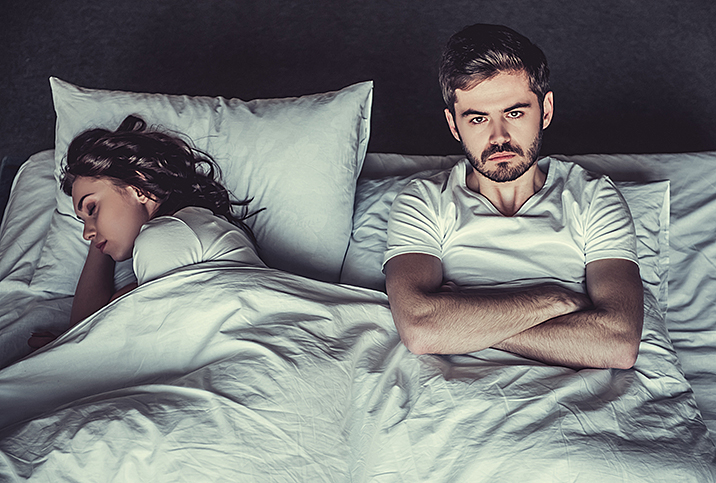The Facts About Mental Health and ED

Mental health affects every aspect of daily living. For men, these effects may ripple into their sex life in the form of erectile dysfunction (ED). Knowing why ED happens, how to treat it and how it interacts with your mental state can enhance your overall quality of life.
An overview of mental health
Mental health includes a person's psychological, emotional and social well-being, according to the Centers for Disease Control and Prevention (CDC). Mental health impacts how people think, feel, behave and interact with others. This impact includes life choices and how they cope with the rigors of daily living.
Mental health is negatively affected when a person's mental, emotional or social challenges exceed their capacity to cope with them. Frequent areas of stress include financial hardship, overworking without adequate time for recovery, or "compassion fatigue" while caring for another person.
When people think of mental health, they often think in terms of mental illness, but the domain is wider and more complicated than that, just as physical health does not strictly revolve around illness. Mental illness certainly damages mental health and therefore complicates physical health. For example, depression makes it more difficult for an individual to focus, maintain an elevated or normal mood, and have a positive self-image, while also increasing their risk of type 2 diabetes, heart disease and stroke.
However, a person with mental illness can still maintain good mental health with proper treatment. But even if they don't have a specific mental illness diagnosis, a prolonged state of poor mental health can affect a person's well-being. Remaining in an unhealthy mental, physical or emotional space can lead to emotional exhaustion and increase the chances of mental illness.
Mental illness occurs frequently in the United States. Mental Health America reports:
- Close to 1 in 5 adults will suffer through a diagnosable mental health-related condition each year
- 46 percent of Americans will qualify for a mental health-related diagnosis in their lifetime
- 44 million American adults struggle with mental illness
- 17.3 million American adults struggle with depression
- 42.5 million American adults struggle with anxiety disorders
Mental illness is a very real part of daily living for millions of people.The more we are aware of the prevalence of mental illness, the better equipped we are to recognize how important it is to take care of our mental health.
The connection between mental health and ED
One key component of a person's well-being is their sexual health. Unfortunately, erectile dysfunction is a common symptom for many people working through mental illness.
Erectile dysfunction occurs when a man is consistently unable to sustain an erection firm enough for sexual intercourse. One of every 10 men experiences erectile dysfunction at some point. ED often originates from underlying issues, some physical and some not, including stress and mental illness.
There are two kinds of stress: good stress (eustress) and bad stress (distress). Examples of good stress include strenuous exercise and sexual arousal. In these situations, good stress releases the sex hormone testosterone. Testosterone plays a key role in arousal, erections and sexual performance.
Bad stress has the opposite effect. Examples of bad stress include negatively focusing on financial hardship or worrying about relationships or work. Instead of releasing testosterone in stressful situations like these, the body releases the hormone cortisol. Cortisol constricts blood flow and, more specific to sexual arousal, limits the blood supply to the penis, which decreases the chance of an erection.
Mental illnesses, such as depression, PTSD and anxiety, impact arousal, as well.
Depression and anxiety disorders are mood disorders that affect how a person feels, behaves and functions in daily living. Everyone has highs and lows, but depression reveals itself as prolonged feelings of sadness, fear, fatigue, guilt or suicidal thoughts exceeding two weeks. Sexually, the chemical imbalances caused by depression can prevent full arousal. To complicate the issue, many of the medications used to treat mood disorders can also limit sex drive and the ability to orgasm.
PTSD refers to the mind's response to a traumatic event. The sufferer will experience flashbacks, periods of hyper-alertness, memory blocks or strong emotions related to a traumatic incident from the past. This can also show up in the form of anxiety and detachment.
In terms of sexual health, the effects of PTSD commonly lead to erectile dysfunction in two ways. Men with PTSD may meet sexual intimacy with aggression because feelings of arousal imitate those of being threatened. Secondly, and similarly, drugs to treat ED compete for the same neurotransmission networks and hormones as those that trigger flashbacks, fear or severe anxiety, causing those feelings to occur during sex.
Anxiety disorders are characterized by involuntary bouts of constant fear and worry, sometimes to the point of panic. Anxiety disorders may spring from traumatic life experiences or could be inherited. People with anxiety disorders could already be prone to anxiety and experience a major life event that triggers a chronic condition.
One of the most common ways anxiety affects sexual arousal is the release of the aforementioned stress hormone cortisol, which restricts blood flow. If the problem persists, the idea of sex can create a confluence of fear, trauma and embarrassment that will become performance-related anxiety that exacerbates the issue.
Performance anxiety
If anxiety caused ED once, the experience can trigger more anxiety regarding sex, which can create a vicious cycle of mounting performance anxiety. Performance anxiety recycles and amplifies all the feelings—guilt, panic, shame, low self-esteem—that work against an erection.
Reiterating the significant connection between mind and body, performance anxiety causes erectile dysfunction by disrupting the matrix of hormones, neurotransmitters and blood vessels that lead to a thriving sex life.
If performance anxiety festers, it can cause a great deal of suffering. While it's true that mental illness and sexual performance are closely knit, they are not inseparable, and there is hope.
Treating mental health and& erectile dysfunction
If the mind and body are completely intertwined, what can you do if the mind is strained or too ill to help the body recover from ED? Doctors are constantly searching for advances in treating mental illness, but a positive first step you can take for yourself is to alter your lifestyle.
If you are taking antidepressants, for example, you may consider exploring whether or not your medication is leading to ED. Some prescriptions cause issues in getting an erection or reaching orgasm, such as:
- Escitalopram (Lexapro)
- Citalopram (Celexa)
- Sertraline (Zoloft)
- Fluoxetine (Prozac)
- Duloxetine (Cymbalta)
- Paroxetine (Paxil and Paxil CR)
If you are taking one of these prescriptions, talk with your doctor to see if there are other medications available that will alleviate your illness without affecting your sex life. If there are no alternatives, consider scheduling your doses after sex or seeing if either Viagra or Cialis can be taken without conflicting with your antidepressant.
Other basic lifestyle changes to help reduce your ED are:
- Talking with a doctor
- Eating a healthy diet
- Losing weight if you're overweight
- Exercising regularly
- Abstaining from drugs and alcohol
- Meditating
- Talking with your partner or a therapist, or both
In addition to changing your lifestyle, these exercises can help:
- Kegels strengthen the pelvic floor muscles. The bulbocavernosus (BC) muscle in particular is responsible for emptying the bladder, filling the penis with blood during an erection, and pushing out semen during ejaculation. In order to locate the BC, you need to clench the muscle used for holding or stopping your urine flow. To start a daily regimen, clench the BC muscle for five seconds and then relax. Do this for 10 to 20 repetitions three times per day.
- Aerobics is designed to increase your heart rate. Aerobic exercises such as walking, running, rowing, cycling and jumping rope increase blood flow and fight against obesity and a sedentary lifestyle, both of which contribute to ED.
- Pilates is a less strenuous exercise designed to work the body lightly while incorporating several muscles at once. These include knee fallouts, supine leg raises, and pelvic curl or glute bridges.
Remember that these are just suggestions for exercises. Any sports or physical activity that you enjoy can help your physical and mental health. Actively taking care of your body and mind by speaking to a doctor or therapist, and making adjustments to your lifestyle can go a long way in helping improve your mind, body and sex life.
Outlook
Recovery from mental illness is possible. It is certainly not going to happen overnight or without setbacks, and it won't happen by itself. By incorporating some basic lifestyle changes and talking with your doctor, you can move closer to overcoming the mental and physical obstacles responsible for ED.


















